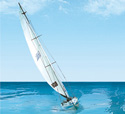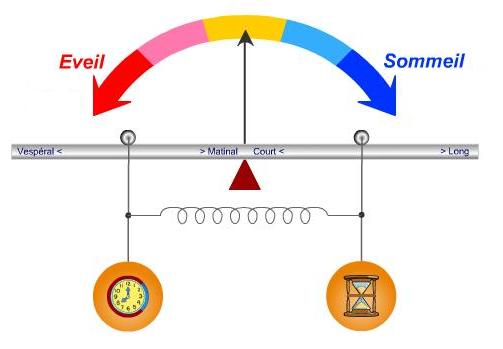Home > Welcome > Sleep-wake pathologies > Insomnia - wanting to sleep > Learn to sleep
Learn to sleep
"Education is an art, able to put everything through so that the vision can be praticed effectively, from an organ that has the ability of it but is not turned how it should and is not looking where it should. »
Friday 21 September 2007
All the versions of this article: [English] [français]

- Be able to steer a racing sail boat
The modern treatment of insomnia must rely on the chronobiological knowledge which allows to understand how to manage to synchronize the two pendulums of sleep.
It is useless to fight against oneself ... someone will only apply the rules in which he/she believes.
NB: These guidelines allow to understand how to act on the "sleep regulation mechanism" in order to synchronize the "two pendulums" (that may take quite a while).
Investigate your rythm. "Sleep is individual and deserves individual information" (the somnological ground is genetically determined from conception).
Cf. "What kind of sleeper are you ?"
Sleep’s Double Pendulum
"I am tired but I don’t feel sleepy ..."
Sleepiness responds to a physiological signal prompted by the brain at a very particular moment of the chronobiological cycle.
The advances of sleep research demonstrate that the "right time" is not just a matter of "psychology".
Tiredness is not the same thing as sleepiness, which is the sensation that someone feels when the brain ORDERS to find a place to sleep.
Sleep responds to a biological mechanism that imposes us a moment to produce some sleep.
It is possible to understand and thus to learn to control that mechanism better.
SEVEN GREAT RULES TO « TAME » SLEEP

- Never « force » against your own (Motivation is arousing):
- Always choose the easiest and less constraining option.
- Try to remain « scientific ». Gently «taming» sleep requires to understand before acting.
- The Sleep/Wake diary is a precious tool to record your observations, make experiments and get objective results.
See the "Sleep-Wake Diary - Understand the mechanisms and implications of tiredness and sleepiness :
- Definition of tiredness (and functional disorders);
- Definition of sleepiness (and purpose of the nap ...).
- To know and be able to favor the sleep synchronizers :
- Light : determine a fixed rising hour in the morning (+/-1h, but respect rule #1)
- Heat : favor the thermal losses in the evenings by opening the bedding (and the window) a couple of minutes before going to sleep, walking on bare feet, having a cold drink (or even by taking a short shower or a feet bath).
- Food : avoid heavy meals during the night (especially fast carbohydrates which favor arousal). You may eat a fruit or a milk product because hunger can be arousing, on the other hand.
- Avoid all stimulants : coffie, tobacco (patches ?)
- Many medications can interfere with sleep.
- Alcohol which doesn’t bring the quality of real sleep and often causes painful arousals during the night (once the organism has eliminated it).
- Try to reduce the time spent in bed without sleeping :
- Do not go to bed too early or before you feel really sleepy (to sleep in less than 15 minutes);
- Do not stay in bed more than 20 or 30 minutes in hope to fall asleep "in spite of all".
- Choose to get up in the morning if you do not sleep more (no matter sleep duration);
- Choose to set your alarm clock a bit earlier if there are long periods of wake during the night
- Try to feel the sensation that precedes sleep (the «true sleepiness»).
- Choose to lie down only to sleep (with closed eyes) when the sleep pressure "lets you know that you have to let go on the pleasure to do something else".
- Avoid to get busy in bed (do not read, watch television, eat, write or work).
- If necessary, go and do something somewhere else (preferably in another room) but without to lie down (in order not to fall asleep « by surprise »).
- Amplify the arousing stimuli during the day
:- Respect the logical contraindications to the nap (neither to sleep, nor to rest...) except in a case of emergency or to make experiments.
- Have some playful and pleasant physical activity (rather around 6 - 8 PM).
- Expose yourself to heat (which «replaces» sport), sauna, hammam, a warm bath,
- Expose yourself to light (people who are exposed to light from outdoors sleep better).
- Seek funny activities and try to get some pleasure every day (pleasure is one of the four "somnications"
"The cheerful recover quickly."(Rabelais)
- Make a program of withdrawal of all sleeping pills
, over-the-counter drugs and "grandma’s recipes" included...- Know the mechanism of action of the sleeping pills.
- Understand their disadvantages (even the occasional ones)
- Do not neglect the difficulties of withdrawal and anticipate them.
Know how to sleep in harmony with one’s own characteristics.
The aim is to retrieve trust in your own ability to control the signals of sleep, which means to be able to "ride the wave" under all circumstances.
Recovering can, under such conditions, only be definitive !
You must become able to ride your race horse like an experienced rider or steer your sailing ship like a solitary navigator on the high sea.

- Riding the wave

- More information...
- BCT of insomnia (Pdf of 15 pages, in French, Mental Health in Quebec, 2003, 87-101).
- Sleep well without medications (Pdf. of 46 pages, in French, Nicole Ouellet, Canada, 2000).
- A testimony from Patrick Poivre d’Arvor on France Inter (le 24/6/07, 15h40) (a French radio broadcast).
"I sleep very very little, 3 or 4 hours, and, when I wake up, I am completely "drowsy". So, no matter if the weather is stormy or rainy, I go out to run for 20 minutes, I think of something else and I am happy".
("No sport" Winston Churchill said)
